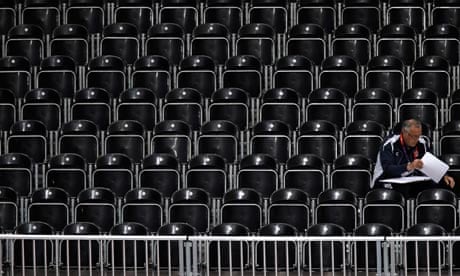The London 2012 Olympics organisers have attempted to defuse the empty seat row by clawing back 3,000 seats from sporting officials who have failed to turn up to events.
Locog said on Monday it had sold the tickets to the public overnight, including 600 for gymnastics sessions, 700 for beach volleyball and more than 100 for swimming.
The move follows widespread criticism from ticketless fans after TV pictures showed the world's top swimmers and gymnasts competing in front of partially full arenas. On Sunday, members of the armed forces were drafted in to fill seats in the gymnastics and basketball.
"We talked to the international federations yesterday," said Jackie Brock Doyle, spokeswoman for Locog. "We were able to put back into the pot for sale about 3,000 tickets last night and they have all been sold. We are going to that on a day to day basis. We are doing it session by session talking to the accredited groups. Everybody is giving up what they can … we got the most from gymnastics."
The system means friends, family and children of sporting officials are likely to see their access to the Olympic venues squeezed in favour of members of the public.
Every evening, Locog, the International Olympic Committee and the sporting federations will meet to agree which blocks of tickets can go back on sale that night. Tickets could appear on the London 2012 ticketing website after midnight for sessions starting the next morning, said Brock Doyle.
Locog said that by selling the tickets only online it allows people across the country to have a chance to purchase seats. But with such tight timeframes the system appears to favour people who live close to the venues.
Some people have complained that they cannot complete the transaction on the website even when tickets appear to be available.
The IOC said it was giving up seats for sale but did not say how many.
The amount of seating taken by the athletic federations is likely to be reassessed in time for the Paralympics, sources said.
In a further move, the number of children who are in the Olympic Park ready to take up empty seats in venues will be increased from 150 to as many as 400.
"We are doing the best we can but it is not an exact science," said Brock Doyle.
There continued to be some empty seats inside the Aquatics Centre on Monday morning.
A spokesman for David Cameron said the prime minister was disappointed by the continued failure to fill empty seats. Cameron was briefed by a Locog member at a routine cabinet committee and given assurances that organisers had already taken action and would do more.
The prime minister's spokeswoman said options being considered included Wimbledon-style resale of tickets and offering free tickets to local schools and colleges. But almost all these schools would have difficulty contacting children during summer holidays.
She said it was inevitable that some seats would be lefty empty since it was impossible to predict the take-up of seats by the Olympic family.
The culture secretary, Jeremy Hunt, told BBC Radio 4's The World At One a possible 30-minute rule was being considered. "Well that's what we're looking at doing. We're looking at whether we are able to do it, but we are hosting this event under a contractual arrangement that we have with the International Olympic Committee and sports federations, and so we do have to respect what we've agreed to contractually in order to get London to host the Games," he said.
He added: "What we're saying to the IOC and to the international sports federations is if you're not going to use them, could we have as many possible back because of course we've got lots of members of the public who would dearly love to go.
"We want to be completely upfront with the public: this is a negotiation, we don't have a right to demand these back.
"In fact, contractually these seats do belong to the international sports federations and to the IOC, but we got 3,000 back last night, including 600 for the gymnastics."
Meanwhile, 29 suspected ticket touts have been arrested since the start of the Games, police said on Monday.
Eleven people have since been charged on suspicion of illegally reselling tickets for London 2012 events, according to Scotland Yard. The suspects, aged between 30 and 57, are due to appear at various London magistrates courts over the next three weeks.







Comments (…)
Sign in or create your Guardian account to join the discussion